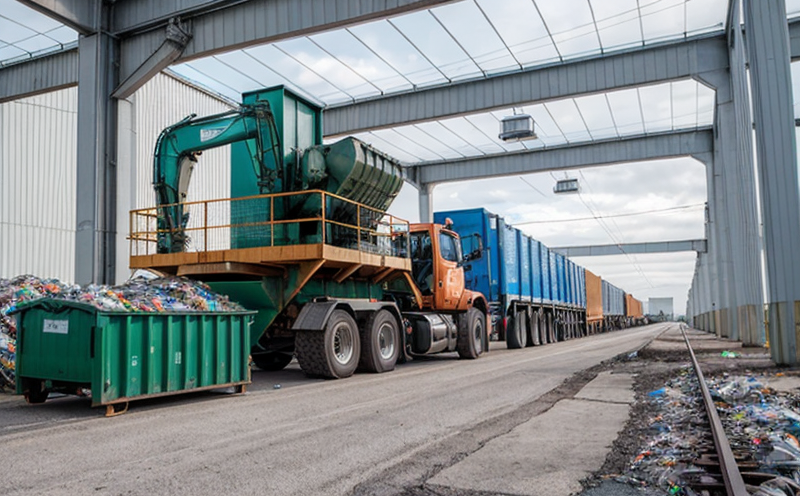ASTM D8181 Electronic Waste Recycling Testing
The ASTM D8181 standard provides a comprehensive framework for the testing of electronic waste recycling processes. This method ensures that recycled materials meet stringent quality standards, thereby promoting sustainable practices within industrial manufacturing and processing sectors. Electronic waste (e-waste) contains valuable resources such as gold, silver, copper, and rare earth elements. Proper recycling not only recovers these materials but also prevents environmental pollution by reducing the volume of hazardous waste.
The ASTM D8181 test evaluates various aspects of e-waste recycling processes including material recovery efficiency, purity of recovered metals, and residual contaminants in recycled products. It is particularly relevant for industries focused on circular economy principles where minimizing waste generation and maximizing resource reuse are key objectives.
At Eurolab, we utilize ASTM D8181 to conduct rigorous testing that helps our clients ensure compliance with international standards while enhancing their operational efficiency. Our team of experts ensures accurate interpretation of results which can inform improvements in recycling technologies, optimize processes, and guide strategic decisions related to sustainable practices.
For instance, when evaluating the effectiveness of a new e-waste recycling process, ASTM D8181 allows us to measure parameters such as yield rates of different metals extracted from the waste stream. This helps identify any inefficiencies in current methods or opportunities for innovation. Additionally, it enables assessment of environmental impacts by quantifying levels of harmful substances left behind after treatment.
The use of this standard ensures consistency across diverse facilities handling e-waste recycling globally. By adhering to ASTM D8181 guidelines, manufacturers can demonstrate commitment to responsible waste management practices and contribute positively towards reducing carbon footprints associated with resource extraction industries.
Why It Matters
The importance of proper electronic waste recycling cannot be overstated in today's world where technology advances rapidly. The lifecycle of many electronic devices is short, leading to significant amounts of e-waste being generated annually. According to the United Nations Environment Programme (UNEP), global e-waste reached 53.6 million metric tons in 2019 alone. Proper recycling ensures that these discarded products are managed responsibly rather than ending up in landfills where toxic materials can leach into soil and water supplies.
ASTM D8181 plays a crucial role by providing precise protocols for testing various stages of e-waste processing. It helps manufacturers understand how efficiently they are recovering valuable resources from old electronics, ensuring that nothing goes to waste unnecessarily. Moreover, it allows companies to verify whether their recycling processes comply with environmental regulations and industry best practices.
Incorporating ASTM D8181 into daily operations also offers competitive advantages by enhancing reputation among stakeholders concerned about corporate social responsibility (CSR). Companies demonstrating leadership in sustainable practices are more likely to attract investors interested in green initiatives. Furthermore, adherence to such standards can open up new markets for recycled materials or components, broadening business horizons.
From a regulatory perspective, compliance with ASTM D8181 is essential because it aligns company activities with global trends towards circular economies and sustainable development goals (SDGs). As governments worldwide implement stricter laws regarding e-waste disposal, having robust testing procedures in place becomes imperative for avoiding fines or other penalties.
Scope and Methodology
| Aspect | Description |
|---|---|
| Sampling Procedures | The sampling process involves collecting representative samples from the recycling facility, ensuring that they reflect all relevant components within the waste stream. Samples are taken in accordance with established procedures outlined in ASTM D8181 to maintain accuracy and reliability. |
| Preparation of Specimens | Once collected, specimens undergo thorough preparation steps which may include cleaning, drying, crushing if necessary, and sieving to achieve consistent particle sizes suitable for subsequent analytical tests. |
| Analytical Techniques Used | A range of advanced analytical techniques are employed depending on the type of metals or elements being targeted. Common methods include X-ray fluorescence (XRF), inductively coupled plasma optical emission spectroscopy (ICP-OES), and atomic absorption spectrophotometry (AAS). |
| Data Analysis | All data obtained from these analyses are carefully analyzed using statistical tools to determine compliance with specified thresholds set forth by ASTM D8181. Any deviations from expected values are investigated further. |
The methodology described above ensures that the results generated through ASTM D8181 testing accurately reflect real-world conditions experienced during actual e-waste recycling operations. This approach helps stakeholders make informed decisions based on reliable information, fostering continuous improvement in recycling practices.
Eurolab Advantages
At Eurolab, our commitment to excellence extends beyond just conducting ASTM D8181 tests; we pride ourselves on delivering unparalleled quality assurance services tailored specifically for the industrial manufacturing and processing sectors. Our experienced team of chemists, engineers, and technicians brings deep industry knowledge combined with cutting-edge laboratory facilities capable of meeting even the most stringent requirements.
We offer several key advantages that set us apart:
- Expertise in Specialized Testing: With extensive experience in handling complex materials from various sources, our team can handle any challenge thrown at them. From difficult-to-process plastics to intricate circuit boards, no job is too big or small.
- State-of-the-Art Equipment: Equipped with the latest analytical equipment, including high-resolution spectrometers and precise weighing scales, we ensure precision in every measurement taken during testing.
- Fast Turnaround Times: Understanding how valuable time is for businesses operating on tight schedules, Eurolab guarantees quick delivery of reports without compromising accuracy or thoroughness. Results are typically available within days instead of weeks.
- Certified Compliance: All our tests follow internationally recognized standards like ISO 17025 and are carried out by certified personnel who adhere strictly to prescribed procedures. This ensures that clients receive accurate, reliable data they can trust.
- Comprehensive Reporting: In addition to numerical results, we provide detailed reports explaining findings along with actionable recommendations for improvement. These insights help companies optimize their processes and stay ahead of competition.
Partnering with Eurolab means accessing world-class expertise at your doorstep. Together, let's transform challenges into opportunities through innovative solutions backed by rigorous scientific validation.





